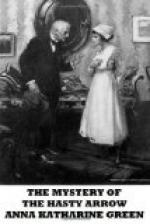If he read the papers afterward it was mechanically. Night, and the one great planet sinking in the West, appeared to appeal to him much more strongly than his books or the more than usually stirring news of the day.
He must have stood an hour in his unlighted window, gazing out at the tumbling waves lapping the shore.
But of his thoughts, God wot, he gave no sign.
Later, he slept.
Slept! with his hand under his pillow! Slept, though there were others in the house awake!—or why this creeping shadow of a man outlined upon the wall wherever the moon shone in, and disappearing from sight whenever the way led through darkness.
It came from above; no noise accompanied it. Where the great window opened upon the sea, lighting up the main staircase, it halted,—halted for several minutes; then passed stealthily down, a shadowy silhouette, descending now quickly, now slowly, as tread after tread is left behind and the great hall is reached.
Here there is no darkness. Open doors admit the light from many windows. A semi-obscurity is all, and through this the figure passes, but hesitatingly still, and with pause after pause, till a certain door is reached—a closed door—the only door which is closed in this part of the house.
Here it stands—stands with profile to the panels, one ear against the wood. One minute—two minutes—five minutes pass. Then a hand goes out and touches the knob. It yields; yields without a sound—and a small gap is seen between the door and its casing. This gap grows. Still no sound to disturb the tragic silence. Stop! What was that? A moan? Yes, from within. Another? Yes. Then all is quiet again. The dream has passed. Sleep has resumed its sway. The gap can safely be made wider. This is done, and the figure halting without, passes in.
XXXI
CONFRONTED
Late in the afternoon of the following day, the expected car entered Mr. Roberts’ spacious grounds. It contained, besides the chauffeur, just two persons, the District Attorney and the Chief Inspector. But it was followed by another in which could be seen Mr. Gryce and a stenographer from the District Attorney’s office.
The house was finished by this time, and to one approaching through the driveway presented a very attractive appearance. As the last turn was made, the sea burst upon the view—a somewhat tumultuous sea, for the wind was keen that day and whipped the waves into foam and froth from the horizon to the immediate shore-line. To add to the scene, a low black cloud with coppery edges hovered at the meeting of sea and sky, between which and themselves one taut sail could be seen trailing its boom in the water.
To one of them—to Mr. Gryce, in fact, upon whose age Fancy had begun to work, this battling craft presented an ominous appearance. It was doomed. The gale was too much for it. Did he see in this obvious fact a prophecy of what lay before the man upon whose privacy they were on the point of intruding?




